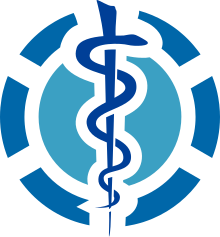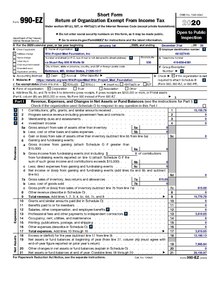WikiProjectMed:WMMED/Reports/2020
| Yearly reports: 2013 • 2014 • 2015 • 2016 • 2017 • 2018 • 2019 • 2020 • 2021 • 2022 • 2023 • 2024 (draft) |

This is a report of activities of Wiki Project Med Foundation for 2020. It is not a complete list of everything we have done this year but represents a highlight of our work. The compiling of this report — like much that we do — has been a group effort, and we encourage involvement by further individuals within the wider membership. It was approved by the board on March 12th 2021.
Efforts
Moved to a new website
This year we moved to our own instance of MediaWiki. This is giving us greater flexibility around content creation and partnerships and greater security around our corporate management.
ILAE
International League Against Epilepsy (ILAE) has recruited a Wikipedian in Residence to support their work with us. They are recruiting more editors to engage.[1]


We worked to get release of graphics to illustrate the importance of efforts to prevent the outbreak. This included supporting the New Zealand group "The SpinOff" to adopt an open license for their COVID material.[2]
A number of us spoke about the work of Wikipedia with respect to coronavirus which was picked up by Wired.[3]
- A Slate article on work on COVID19.[4]
- DailyDot Meet the Wikipedia editors fighting to keep coronavirus pages accurate[5]
- Why Wikipedia is winning against the coronavirus 'infodemic'[6]
- Why Wikipedia Is Immune to Coronavirus[7]
Our World in Data
Collaborated on a mass upload of Our World in Data content to Commons.[8]
Universities
- w:University of Virginia
- Queen's University undergraduate medical students (annual editing initiative)[9]
NNLM
Collaboration Across Cyberspace: National Network of Libraries of Medicine's (NNLM) Wikipedia Editing Campaigns[10]
Creative Commons
Supporting them in discussion of copyright for COVID19 material.[11]
HealthPhone
Clarified and extended our partnership with HealthPhone.[12]
IIAB
Coverage of WPM:IIAB on the BBC World Service.[13] We shipped 16 devices this year bringing the total distributed since 2017 to about 230. This included 4 to Cambodia and 6 to Papua New Guinea.
Additional Offline Content
- 6,000 articles from Genetic and Rare Diseases Information Center (GARD) at the NIH[14] (Download ZIM)
- 8,000 articles from StatPearls[15] (Download ZIM)
Enhancements
- Kiwix Android app directly installable from IIAB
- Improved customization
WHO
The World Health Organization in October of 2020 agreed to adopt an open license for more of the material that they produce.[16][17] This is a continuation of efforts that started back in 2012 in collaboration with Bedirhan Ustun (who has since retired from WHO).[18][19] And builds upon the prior release of the WHO Model List of Essential Medicines in 2017 and a prior Wikipedian in Residence at WHO.[20]
Offline app
The offline app we have developed in collaboration with Kiwix has a rating of 4.7 on Google Play for the English version from 21,250 comments. The full English version has about 65,000 active downloads while the German version has 6,800, the Spanish version has 5,800, the Portuguese version has 430, the French version has 16,800, the Arabic version has 44,800, the Persian version has 4,900, the Odia version has 91, and the Japanese version has 1,600. The mini English version has 11,600.[21]
Community organization
Due to COVID-19 the usual Wikimedia in-person gatherings could not convene. There was no Wikimedia Summit or Wikimania this year. The organization was a signatory to the Meta:Community open letter on renaming
Cochrane
Cochrane volunteers continue to be active on Wikipedia, focusing on adding new evidence to fill gaps in articles, keeping existing articles up to date, and verifying existing evidence that is shared in articles. This project is organized through a "project page" that is also available in Spanish.[22] Cochrane supports this week by employing a part-time Wikipedian in Residence and donating 100 free library "cards" to active Wikipedia editors.
Digital Arabic Content Club

Led by Mossab Banat, Wikipedia Education Program team at Hashemite University in Jordan which works under the umbrella of the Digital Arabic Content Club at Deanship of students affairs started an editathon to encourage students to translate articles about COVID-19 Pandemic from English to Arabic between January 2020 and September 2020. This initiative yielded the creation of 255 new articles with more than 4.84M added bytes and 266K page views. In the same context, Wikipedia Education Program team at Hashemite University started a campaign to recruit students to translate articles related to First Aid from English to Arabic between 21st of April until the end of July which yielded the creation of 391 new articles with more than 3.83M added bytes and 253K page views.
Administration
Membership
At the end of November 2020, the membership of WPMF stood at 200.
Financials

All values are in USD.
Income
- $15,000.00 Donation from University
- $615.00 IIAB related payments
- $155.78 Other donates
Total $15,770.78
Expenses
- $21.55 Paypal fees
- $24.10 Banking fees
- $3,565.00 Hosting and software development
Total $3,610.65
Assets
- Bank account: $15,830.01
- Paypal: $4,285.96
Total: $20,115.97 (up from $7,955.84)
Previous reports
Reports (IRS)
|
|
References
- ↑ "Call for Wikipedia Contributors" (PDF). ILAE. 11 November 2020. Retrieved 2 March 2021.
- ↑ "Want to download this gif". Twitter. Retrieved 2 March 2021.
- ↑ Benjakob, Omer (9 February 2020). "On Wikipedia, a fight is raging over coronavirus disinformation". Wired UK. Retrieved 2 March 2021.
- ↑ Harrison, Stephen (19 March 2020). "The Coronavirus Is Stress-Testing Wikipedia's Systems—and Editors". Slate Magazine. Retrieved 2 March 2021.
- ↑ "Meet the Wikipedia editors fighting to keep coronavirus pages accurate". The Daily Dot. 24 March 2020. Retrieved 2 March 2021.
- ↑ Dodds, Laurence (3 April 2020). "Why Wikipedia is winning against the coronavirus 'infodemic'". The Telegraph. Retrieved 2 March 2021.
- ↑ "Why Wikipedia is immune to coronavirus". Haaretz.com. Retrieved 2 March 2021.
- ↑ "Category:Our World In Data". commons.wikimedia.org. Retrieved 2 March 2021.
- ↑ "Wikipedia:CARL Medical Editing Initiative". Wikipedia. 12 October 2020. Retrieved 6 March 2021.
- ↑ Cowles, Kelsey (28 February 2020). "Collaboration Across Cyberspace: NNLM's Wikipedia Editing Campaigns". Distance Library Services Conference. Retrieved 2 March 2021.
- ↑ "Now Is the Time for Open Access Policies—Here's Why". Creative Commons. 19 March 2020. Retrieved 2 March 2021.
- ↑ "Our Partners - HealthPhone™ - Health, Nutrition, Education, Instructional, Tutorials, Training, Medical Videos for Mother and Child". www.healthphone.org. Retrieved 2 March 2021.
- ↑ "How to put the internet in a box". PodLink. Retrieved 21 October 2020.
- ↑ "Genetic and Rare Diseases Information Center (GARD) – an NCATS Program | Providing information about rare or genetic diseases". rarediseases.info.nih.gov. Retrieved 4 March 2021.
- ↑ "StatPearls". StatPearls Publishing. 2021. Retrieved 4 March 2021.
- ↑ Jr, Donald G. McNeil (22 October 2020). "Wikipedia and W.H.O. Join to Combat Covid-19 Misinformation". The New York Times. Retrieved 2 March 2021.
- ↑ "The World Health Organization and Wikimedia Foundation expand access to trusted information about COVID-19 on Wikipedia". Wikimedia Foundation. 22 October 2020. Retrieved 2 March 2021.
- ↑ "Wikipedia:WikiProject Medicine/ICD11". Wikipedia. 16 October 2012. Retrieved 2 March 2021.
- ↑ "WHO | Online encyclopedia provides free health info for all". WHO. Retrieved 2 March 2021.
- ↑ "Talk:WHO Model List of Essential Medicines". Wikipedia. 10 December 2020. Retrieved 2 March 2021.
- ↑ "All apps". Google Play. Retrieved 2 March 2021.
- ↑ "Wikipedia:WikiProject Medicine/Cochrane". Wikipedia. 5 April 2020. Retrieved 6 March 2021.